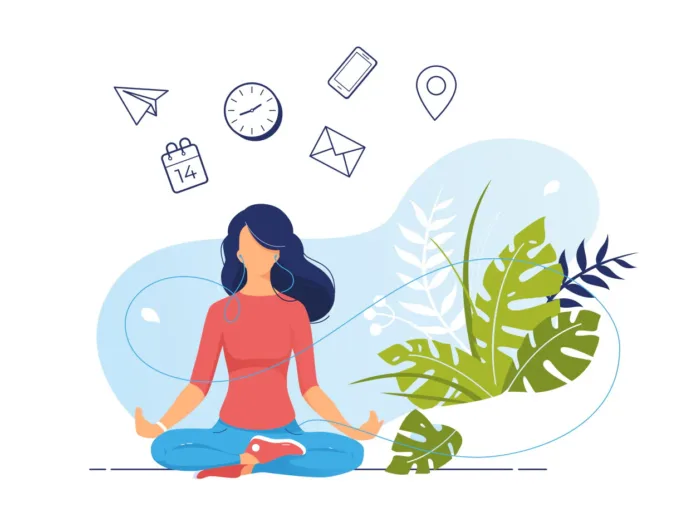
In today’s fast-paced world, the ability to unwind and maintain peace of mind is more important than ever. Whether you’re dealing with deadlines, digital overload, or daily responsibilities, stress can significantly affect your physical and emotional health. That’s where mental relaxation techniques come in.
Mental relaxation is not just about lying down or taking a break; it’s a structured approach to calming your thoughts, lowering stress levels, and promoting overall well-being. In this article, we’ll explore what mental relaxation really means, why it’s essential, and the most effective ways to incorporate it into your daily routine.
🧠 What Is Mental Relaxation?
Mental relaxation techniques are deliberate practices that reduce mental tension and emotional stress. They allow your mind to rest, reset, and recharge. These techniques often involve focusing your attention, controlling your breathing, or altering your thought patterns to achieve a state of calm.
Unlike physical relaxation, which targets muscles and body tension, mental relaxation is about managing your thoughts, emotions, and inner dialogue. With regular practice, these methods can lead to improved focus, better sleep, reduced anxiety, and an overall sense of balance.
🌿 Why Mental Relaxation Is Important
Modern lifestyles are full of constant stimuli—emails, news updates, social media, and multitasking. Over time, this overload can trigger anxiety, irritability, burnout, and even depression. Learning how to calm your mind is not just helpful—it’s essential for maintaining your mental health.
Here are a few key benefits of practicing mental relaxation techniques:
Reduces anxiety and stress
Improves emotional stability
Enhances sleep quality
Increases productivity and focus
Boosts creativity and mental clarity
Promotes a sense of inner peace
🧘 Top 7 Mental Relaxation Techniques to Try
Let’s dive into some of the most effective and widely recommended techniques for calming your mind and achieving lasting relaxation.
1. Deep Breathing Exercises
Breathing is the gateway to both physical and mental relaxation. Deep breathing activates the parasympathetic nervous system, which slows the heart rate and reduces stress hormones.
How to do it:
Sit or lie down in a quiet space.
Inhale slowly through your nose for a count of 4.
Hold your breath for a count of 4.
Exhale through your mouth for a count of 6.
Repeat for 5–10 minutes daily.
2. Progressive Muscle Relaxation (PMR)
This technique involves tensing and then relaxing each muscle group in the body, helping you to identify and release physical tension that may be tied to mental stress.
Start with:
Your feet and work your way up to your head.
Tense each muscle group for 5 seconds, then release.
Focus on the sensation of relaxation after each release.
3. Mindfulness Meditation
Mindfulness is one of the most powerful relaxation exercises. It encourages you to observe your thoughts and emotions without judgment, helping you stay grounded in the present moment.
Try this:
Sit comfortably, close your eyes, and focus on your breath.
When your mind wanders, gently return your attention to your breath.
Practice for 10–20 minutes each day.
4. Visualization or Guided Imagery
This technique involves mentally picturing a peaceful scene—like a beach, forest, or quiet room. It uses your imagination to induce calmness and clarity.
How it helps:
It taps into your brain’s sensory memory and can reduce anxiety naturally by triggering a relaxation response.
5. Affirmations and Positive Self-Talk
Your internal dialogue shapes your emotions. Positive affirmations can help shift your mindset from stress and doubt to empowerment and calm.
Examples:
“I am calm and in control.”
“My mind is clear, and my heart is peaceful.”
“I can handle whatever comes my way.”
6. Digital Detox Sessions
Even short breaks from screens can have powerful effects on your mental state. Set aside time each day to unplug from devices and reconnect with yourself or nature.
Benefits:
This reduces mental fatigue, promotes clarity, and helps your brain reset from overstimulation.
7. Journaling for Mental Clarity
Writing down your thoughts can be an effective form of self-reflection and stress relief. Journaling allows you to process emotions, clear mental clutter, and track your personal growth.
Tip:
Write freely without censoring yourself for 10–15 minutes each day. Focus on how you feel and what you’re grateful for.
🌙 Best Times to Practice Mental Relaxation
Incorporating mental relaxation techniques into your daily life doesn’t require a complete routine overhaul. Start small, and choose times that naturally align with quiet and reflection:
Morning: Set the tone for a calm and focused day.
Midday: Use short breaks to reset during work or study.
Evening: Unwind before bed to promote restful sleep.
🧩 Combining Techniques for Greater Impact
Sometimes, blending two or more relaxation methods can be even more effective. For example:
Meditation + Deep Breathing: Amplifies the calming effect.
Journaling + Affirmations: Replaces negativity with empowering thoughts.
Visualization + Music: Enhances the sensory experience of peace.
Experiment to find what works best for your lifestyle and stress triggers.
✅ Final Thoughts
Learning and practicing mental relaxation techniques is an investment in your long-term well-being. These simple but powerful habits can help you manage stress, boost resilience, and improve your overall mental health.
Just like physical exercise strengthens the body, mental relaxation strengthens your ability to stay calm, focused, and emotionally balanced—no matter what life throws at you.
Start today. Take a deep breath. Clear your mind. And give yourself the gift of peace.